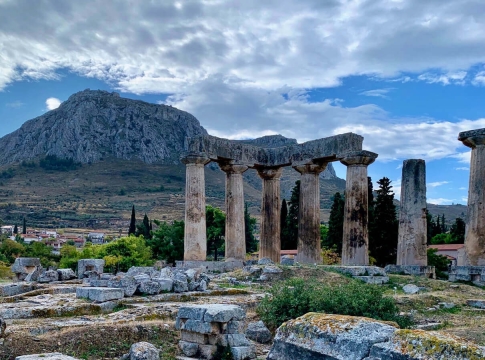
The main focus of the epistle to the Ephesians is Christ, who has brought all creation back to God and brought His church together with individuals from all over the world. The letter is divided into two main sections: chapters 1-3 provide an exposition of the theory, while chapters 4-6 provide the next moral instruction.
- Greetings (1:1-2)
- Spiritual blessings in Christ (1:3-23)
- Saved by grace through faith (chapter 2)
- The mystery of the Gospel (chapter 3)
- Unity, life and light in Christ (4:1-5:21)
- Wives, husbands, children and slaves (5:22-6:9)
- The whole armor of God (6:10-20)
- Final greetings (Ephesians 6:21-23)
- Main messages for us
Greetings (1:1-2)
To his readers, the saints of Ephesus, [the apostle Paul] offers grace and peace from God our Father and the Lord Jesus. An prominent city in Asia Minor, or modern-day Turkey, was Ephesus. Paul worked in Ephesus for two years on his third missionary tour (Acts 19:10). This letter, along with the ones to the Colossians and Philemon with Tychicus, was most likely written by him when he was imprisoned in Rome (Ephesians 3:1; 4:1; 6:20). It was sent around the year 62 AD.
In the epistle, Paul makes no reference of specific individuals or instances, and in some significant manuscripts, the phrase “in Ephesus” (Ephesians 1:1) is absent. This suggests that the letter was probably meant to be distributed across the vicinity of Ephesus.
Spiritual blessings in Christ (1:3-23)
Paul begins with a greeting before praising God, the Father of our Lord Jesus Christ, in lofty terms. He picked us before the world was created and has gifted us in Christ with all we need for redemption.
The Gospel announced the inheritance of salvation, which we received in Christ. Paul then asks that the Ephesian believers would gradually come to understand the boundless magnificence of God’s might as it was demonstrated in Christ.
Saved by grace through faith (chapter 2)
Following his account of salvation from God’s viewpoint, Paul now speaks directly to the Ephesians, explaining what transpired after they accepted the gospel. We were first dead in sin and trespasses, he writes (Ephesians 2:1).
However, as stated in Ephesians 2:5, God raised us up with Christ and seated us with Him in the heavenly realms. He also made us alive alongside Christ. God has given us everything, not because of our efforts: “For by grace you have been saved through faith” (Ephesians 2:8). Actually, [God foresaw the good deeds], therefore we ought to walk in them. Like Israel, the Gentiles have access to the Father in one Spirit via the work of Christ.
The mystery of the Gospel (chapter 3)
In the following chapter, Paul addresses Jews and Gentiles once more. Gentiles are members of the same body as believers and sharers of the promise in Christ Jesus through the Gospel since the revelation of the Gospel (Ephesians 3:6).
Paul was able to proclaim the unsearchable riches of Christ by revealing this mystery, which had been hidden for ages (Ephesians 3:8). Paul ends the first major section with a stirring prayer, asking God to fill the Ephesians with all of God’s fullness (Ephesians 3:19).
Unity, life and light in Christ (4:1-5:21)
Paul now discusses the gospel’s practical consequences for the Ephesian Christians after outlining its key tenets. The members of the church ought to be united in Christ, [attached as one body], notwithstanding their differences.
Instead of walking in the shadow of their transgressions, they ought to walk in love and light after being regenerated mentally. Paul lists and denounces every sort of sin. Since Christ now shines upon the Ephesian Christians and they have risen from the dead, they ought to live lives worthy of their calling.
Wives, husbands, children and slaves (5:22-6:9)
When Paul addresses wives, husbands, children, and slaves in succession, he becomes even more pragmatic. He draws a comparison between the mystic bond between Christ and His church and marriage.
As Christ loves the church, husbands should also love their spouses (Ephesians 5:29). According to Ephesians 5:22, wives should obey their husbands as they would the Lord. Furthermore, Paul gives guidance on how to live a Christian life to parents, masters, bondservants, and children.
The whole armor of God (6:10-20)
A Christian’s life is not lived in isolation. We have access to the whole suite of armor equipment. In Ephesians 6:11–12, Paul goes into detail about the components of the Roman soldier’s armor that a Christian needs in order to resist the devil’s plans, as well as those of the rulers, authorities, cosmic powers, and spiritual forces of evil.
To fight the adversary, we require the sword of the Spirit, the helmet of salvation, the breastplate of righteousness, the belt of truth, and the shield of faith (Ephesians 6:18). We also need to pray constantly in the Spirit.
Final greetings (Ephesians 6:21-23)
Paul wishes his readers peace, love, trust, and grace in the Lord Jesus Christ as he wraps up his letter with a remark about the postman Tychicus.
Main messages for us
- The basis of salvation is God’s free election in Christ prior to the creation of the world.
- Sin is a state of death rather than a coincidental flaw.
- By trust in Christ, we are able to enjoy all the spiritual benefits of salvation.
- Jews and Gentiles are now united in one body.
- Our lives are changed by the gospel, causing us to walk in the light instead of the dark.
- Wives and husbands ought to emulate how they relate to the church and to Christ.
- We are able to withstand the devil’s temptations because of God’s armor.





